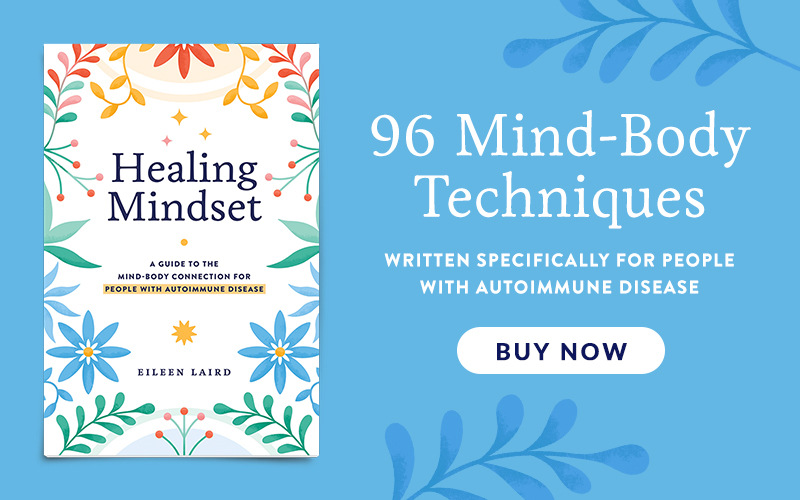“Yes, I am imperfect and vulnerable and sometimes afraid, but that doesn’t change the truth that I am also brave and worthy of love and belonging.”
~ Brené Brown
What Did I Do to Cause This?
When I was diagnosed with rheumatoid arthritis, it felt like a personal failure – not just to me, but also to many people who knew me. “But you’re so health-conscious! How did this happen?” The unspoken words I heard were, “What did you do to cause this?” And that question has popped into my head at each step of this journey that I couldn’t control. In case you’ve ever felt the same, I want you to know this:
You Are Not a Failure If:
- You’ve been diagnosed with autoimmune disease or another chronic illness.
- You couldn’t cure the incurable.
- You need medication to manage your symptoms.
- Your autoimmune disease flares.
- You need to cancel plans with a friend.
- Your body can’t do what it used to do.
- You need help.
- Your illness impacts your family.
- You aren’t in control.
When I read that list, especially that last bulletpoint, I feel my chest restrict, and a little voice inside shouts, “But I want to be in control!” I think that’s a very human shout, which is ironic because no one is in complete control. That doesn’t mean our choices don’t matter – they do. Reversing autoimmune disease is all about reducing autoimmune symptoms and reclaiming abilities we thought were lost forever. My life is dramatically better today than it was at RA onset. But I still have rheumatoid arthritis.
You Do Not Need to Be Perfect to Be Worthy
Those of us who harness diet, lifestyle, and mindset to feel our best often set very high standards for ourselves. These are the things we can control, so we control them to their maximum. We not only expect perfect results, we often think we can behave perfectly. There’s nothing wrong with empowerment – making healthy choices has a big impact on how our autoimmune disease expresses itself. But what happens if we make a “less than healthy” choice? If we stay up too late, eat an inflammatory food, over-exercise, overbook ourselves, skip our self-care routine, etc.? Do we judge ourselves with each imperfect choice? If those choices lead to an autoimmune flare, are we filled with shame and self-blame? Because guess what? That kind of pressure and self-judgement is inflammatory, which creates a vicious cycle.
Letting go of perfectionism doesn’t mean we stop taking care of ourselves. It means we learn to love ourselves no matter what and give ourselves grace in our imperfect moments. One more thing: flares sometimes happen no matter what we do. It’s the nature of autoimmune disease. Ideally, they become less frequent, less severe, and we learn skills to navigate them more quickly. But whether we know the cause or not, flares are not failures.
Gifts From My Autoimmune Diagnosis
Some people will say that their autoimmune diagnosis is actually a blessing. I don’t know that I would classify it 100% that way, but after 6 years, it has given me many gifts alongside the challenges:
- Making peace with my imperfections.
- A truer self-love.
- Grace in dark moments.
- Strength I never knew I had.
- Deeper empathy.
- A supportive community.
- Gratitude for abilities I used to take for granted.
- Faith in my own resilience.
You May Also Be Interested In








You’re so welcome. This is exactly why I wrote this post. Self-compassion is a skill we can build, right alongside everything else we do for self-care. It’s not something we master overnight, though. If you haven’t listened to this podcast yet, I highly recommend it: Episode 80: Self-Compassion with Dr. Kristin Neff. And the next time a friend or family member hints that you caused your illness, feel free to send them this link.
You’re so welcome. It’s fascinating what friends will say, isn’t it? While we can’t change others, self-compassion is a wonderful gift to give ourselves.
I cannot express just how much I appreciate what you wrote. This has been a fairly regular cycle for me, the failure and self blame issue and it can be difficult to stop. Especially when some family, friends and strangers think the same thing. You can end up feeling very alone, on top of having serious health problems to battle.
Thank you for this wonderful post! I do feel like a failure at times. I could not control my illnesses – like getting a bad case of C. Diff, SIBO, post infectious IBS with chronic diarrhea, Full Thickness rectal Prolapse , Mast Cell ActivationDisease & probable Ehler Danlo Syndrome. Just had a friend whom I did clinical training many years ago say “you were so health conscious and ate so healthy!” Guess I have to let go of my expectations of myself…..Thank you.